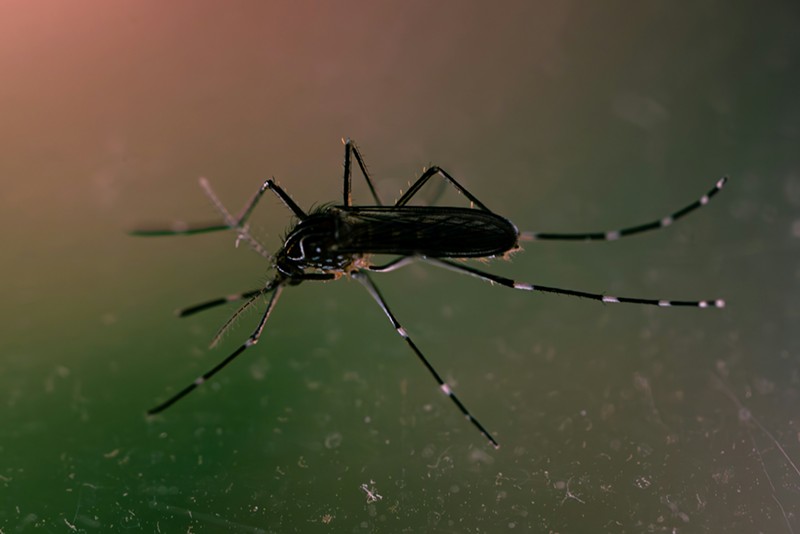We love all animals — except mosquitoes. They can go straight to hell.
According to a new study out of Ohio State University, hemp might help us cast those winged demons back to the fiery pits where they belong.
The study, shared in the scientific journal Insects, documented how researchers applied cannabidiol (CBD) extracted from hemp to mosquito larvae. Strains of mosquito larvae considered resistant to insecticides and susceptible to insecticides were both used in the study, according to lead author Erick J. Martínez Rodríguez.
Within 48 hours of being exposed to the CBD extract, Martínez Rodríguez and his team of five researchers discovered both types of mosquito larvae had died. According to the study results, CBD was the "primary active compound," suggesting that hemp extracts and cannabinoids are "potentially valuable sources for developing biopesticides to control mosquitoes."
How did Martínez Rodríguez, a graduate student studying entomology at Ohio State, figure this out? After being inspired to look for natural and sustainable insecticides to curb mosquitoes — described as "vectors of emerging and re-emerging human pathogens" in his published research — he settled on hemp extract, citing various studies showing that multiple species of bug larvae doesn't like CBD-rich strains of hemp plants.
Upon discovering the dead mosquito larvae after applying the hemp extract, Martínez Rodríguez and his team used chromatography-mass spectrometry and nuclear magnetic resonance to analyze the leftovers, which were dominated by cannabidiol (CBD). Applying a more isolated form of CBD further confirmed it was "primarily responsible for the toxicity of the hemp leaf extract," the study notes.
Researchers were confident in the hemp extract's ability to kill larvae strains that weren't resistant to pesticides, but admit to being pleasantly surprised that CBD killed the resistant strains, too.
According to Martínez Rodríguez, the CBD extract that researchers settled on kills mosquito larvae at about half the rate of conventional synthetic pesticides, but he told an Ohio State news service that "a relatively low amount" is needed in comparison to other natural extracts tested in his lab.
While CBD may be toxic to certain bugs, the non-intoxicating cannabis extract is a wellness supplement for humans and pet cats, dogs and mammals, often used for anxiety, skin conditions, pain, inflammation and other ailments.
Hemp has helped humans expel other disease-causing outcasts from the environment before. In the late1990s, a company called Phytotech reportedly used hemp to clean the soil around Chernobyl of radioactive materials, as well as pesticides, solvents and other toxins. A 2012 study in China showed that hemp can also be used to absorb cadmium, a toxic metal that can cause cancer and other systematic diseases.

Audio By Carbonatix
[
{
"name": "Air - MediumRectangle - Inline Content - Mobile Display Size",
"component": "12017618",
"insertPoint": "2",
"requiredCountToDisplay": "2",
"watchElement": ".fdn-content-body",
"astAdList": [
{
"adType": "rectangle",
"displayTargets": "mobile"
}
]
},{
"name": "Editor Picks",
"component": "17242653",
"insertPoint": "4",
"requiredCountToDisplay": "1",
"watchElement": ".fdn-content-body",
"astAdList": [
{
"adType": "rectangleLeft",
"displayTargets": "desktop|tablet"
},{
"adType": "rectangleRight",
"displayTargets": "desktop|tablet|mobile"
}
]
},{
"name": "Inline Links",
"component": "18838239",
"insertPoint": "8th",
"startingPoint": 8,
"requiredCountToDisplay": "7",
"maxInsertions": 25
},{
"name": "Air - MediumRectangle - Combo - Inline Content",
"component": "17261320",
"insertPoint": "8th",
"startingPoint": 8,
"requiredCountToDisplay": "7",
"maxInsertions": 25,
"watchElement": ".fdn-content-body",
"astAdList": [
{
"adType": "rectangleLeft",
"displayTargets": "desktop|tablet"
},{
"adType": "rectangleRight",
"displayTargets": "desktop|tablet|mobile"
}
]
},{
"name": "Inline Links",
"component": "18838239",
"insertPoint": "8th",
"startingPoint": 12,
"requiredCountToDisplay": "11",
"maxInsertions": 25
},{
"name": "Air - Leaderboard Tower - Combo - Inline Content",
"component": "17261321",
"insertPoint": "8th",
"startingPoint": 12,
"requiredCountToDisplay": "11",
"maxInsertions": 25,
"watchElement": ".fdn-content-body",
"astAdList": [
{
"adType": "leaderboardInlineContent",
"displayTargets": "desktop|tablet"
},{
"adType": "tower",
"displayTargets": "mobile"
}
]
}
]












